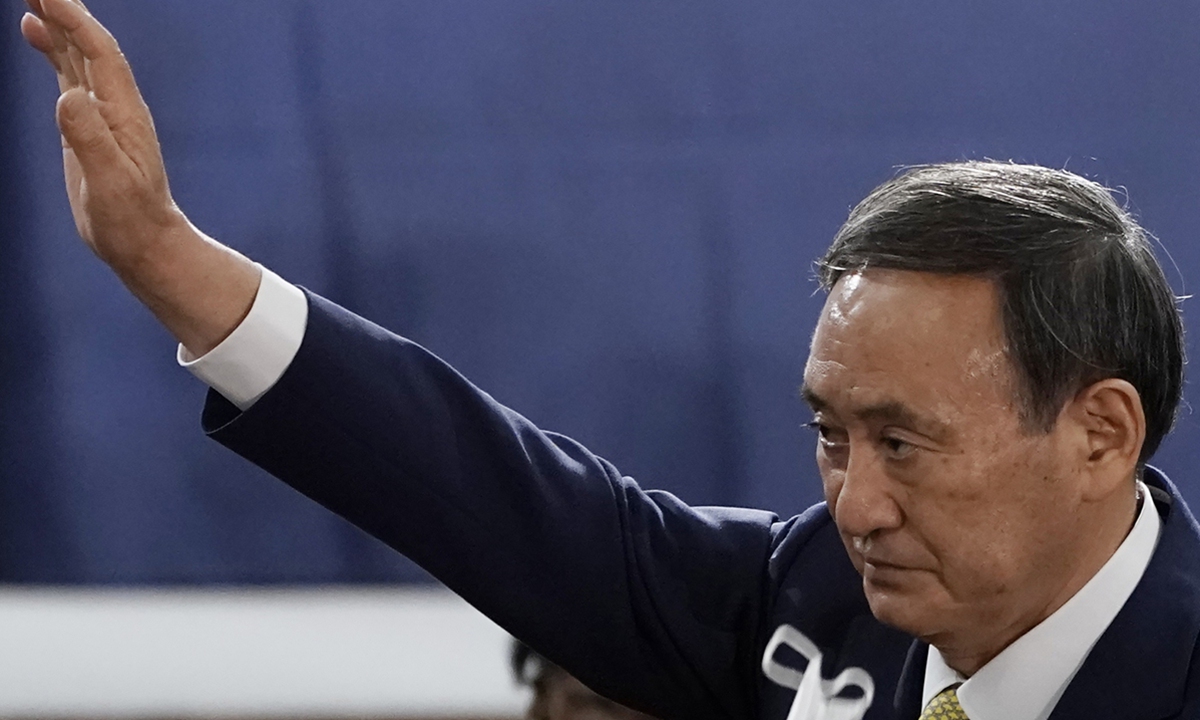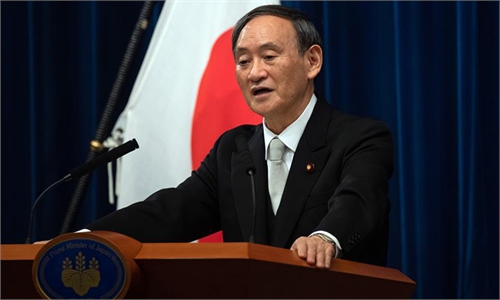
Japanese Prime Minister Yoshihide Suga Photo: AFP
Japanese Prime Minister Yoshihide Suga's government approved a ninth consecutive rise in military spending on Monday. The Ministry of Defense will get a record 5.34 trillion yen ($51.7 billion) for the year starting in April, up 1.1 percent from this year.
According to Reuters, Japan will spend $323 million to begin development of a long-range anti-ship missile and purchase six Lockheed F-35 stealth fighters from a US company.
Japan's military expenditures are only about one percent of its GDP, which is relatively low on the global stage, so there is certain room for Japan's military to expand. In addition, if Japan wants to change its "exclusively defense-oriented" strategy to both defense and offense, it needs to develop and buy new weapons and equipment to improve its capabilities. Besides, pressure from the US for more military assistance is urgent. This is inevitably leading Japan to increase its military budget.
Japan plans to buy these new weapons and equipment, in part, to match the US military level. Equal or close military capabilities are the basis of the US-Japan military alliance. Only in this way can the two countries coordinate with each other in drills and military operations. Washington wants Tokyo to pay more for joint military exercises. From Tokyo's perspective, most of its previous weapons and equipment were for defense. But now it needs to increase its investment in offensive weapons to achieve both offensive and defensive demands.
Japan has been trying to revise Article 9 of the Japanese Constitution since former Prime Minister Shinzo Abe took office and sought to improve military capabilities. Tokyo can only achieve this by taking small, but fast steps. Some analysts think that Japan will continue to increase its military budget this year and next. This bump-up in the budget is a result of both internal demands and pressure from the US. Another important reason comes from the continuous enhancement of China's military strength.
Also, Japan's military alliance with the US has expanded its scope of cooperation beyond Japan's borders and is now probing "gray" areas (such as the South China Sea and the Taiwan Straits). With the implementation of the US' Indo-Pacific strategy, Japan may have more military cooperation with India in the future after signing the Acquisition and Cross-Servicing Agreement.
Japan is also keen on building an Indo-Pacific military alliance with the US. In addition to the US, Australia, and India, Japan also hopes to rope in more countries into the military alliance to deal with China.
However, the Japan-US alliance is based on taking advantage of each other. This is actually a severe threat and risk to peace and stability in the Asia-Pacific region. As Tokyo develops both defensive and offensive capabilities, Washington will also add American technology into Japan's self-developed weapons. Hence, Washington will maintain control over Tokyo's ambitions to independently develop its own weapons.
With the purchase of new weapons and equipment, Tokyo aims to build a stronger sea-based missile defense system. Japan hopes to acquire the ability to preemptively strike at the opponent's deep target through moves such as developing a long-range anti-ship missile and purchasing six Lockheed F-35 stealth fighters. This is what is needed to be both defensively and offensively capable.
This means more budget is needed. Tokyo will further adjust its national strategies according to changes in US strategies. Reuters reported that Japan will "build two compact warships that can operate with fewer sailors than conventional destroyers, easing pressure on a navy struggling to find recruits in an aging population." In fact, the aging population is merely an excuse for Tokyo to improve its autonomous weapons systems.
It should be noted that Washington's support is indispensable for Tokyo for its military capabilities and combat abilities. Once US support is absent, Japan's loophole to rearm will be very clear. Japan cannot develop comprehensive combat capabilities without the assistance of the US. Therefore, in the very long term, Tokyo will need to keep Washington close as a military ally and partner.
The author is a Chinese mainland military expert and TV commentator. opinion@globaltimes.com.cn

